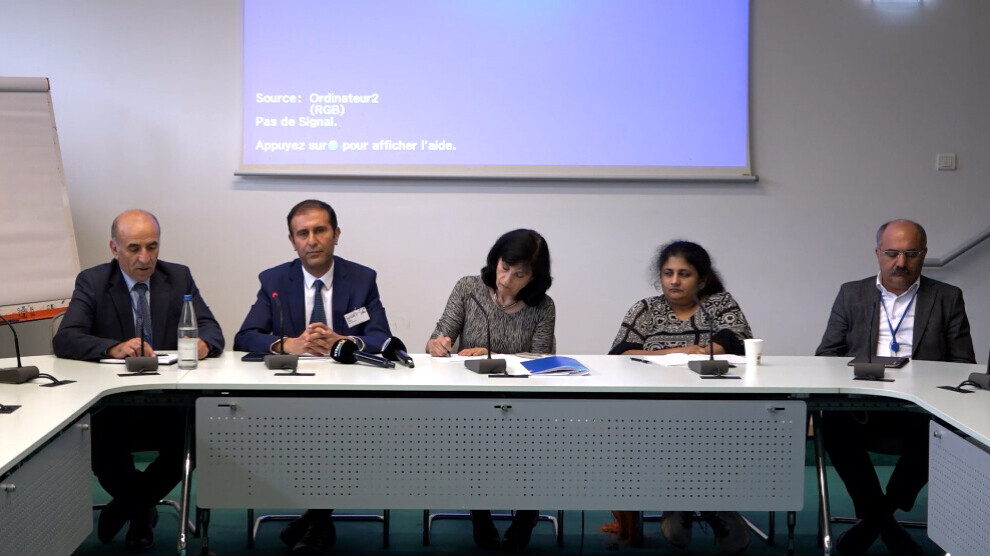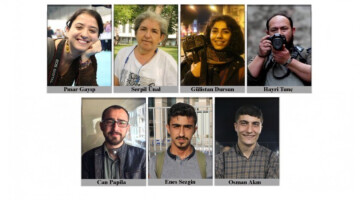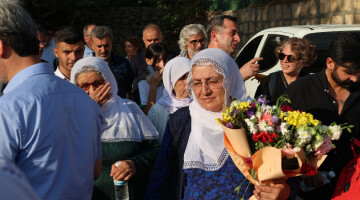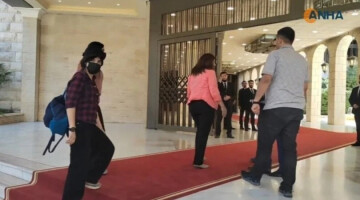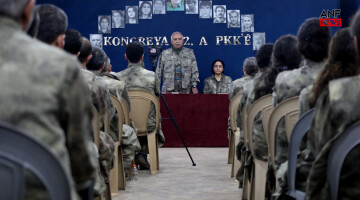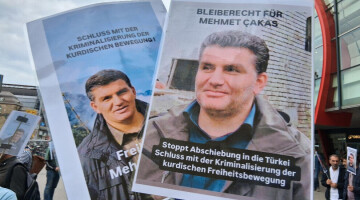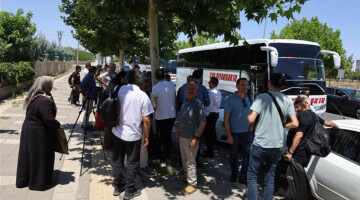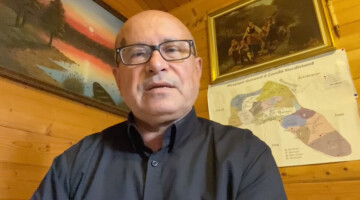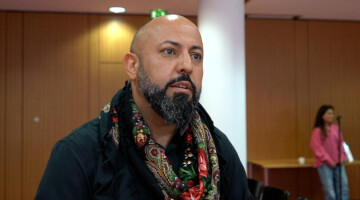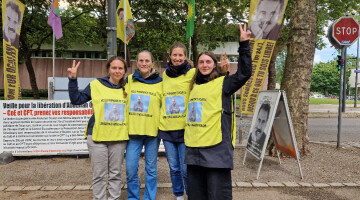A delegation of the DEM Party and İbrahim Bilmez, who are in Strasbourg to attend the meetings of the Parliamentary Assembly of the Council of Europe (PACE) between 30 September - 4 October 2024, held a series of meetings. During the meetings, human rights violations in Turkey, anti-democratic practices and problems in the field of law were expressed. Lawyer İbrahim Bilmez, who also held a meeting with officials from the CPT (Committee for the Prevention of Torture), handed over a dossier on the absolute isolation of Abdullah Öcalan in İmralı Island Prison, torture and genocide system and the absolute lack of communication with Öcalan.
On the last day of the meetings, a press conference was held at the Council of Europe on ‘The Situation of Political Prisoners in Prisons in Turkey’, with a special focus on the İmralı system of isolation, torture and genocide and the Council of Europe Council of Ministers' resolution on the Right to Hope.
The press conference was moderated by academic Dr Sarah Glynn and attended by Asrin Law Office Lawyer İbrahim Bilmez, Left Unity Group Parliamentarian Dr Deepa Govindarajan Driver and DEM Party Amed (Diyarbakır) MP Berdan Öztürk.
After Berdan Öztürk's evaluation of the system of isolation, torture and genocide against Kurdish People's Leader Abdullah Öcalan in İmralı, İbrahim Bilmez, a lawyer of Asrın Law Office, took the floor.
‘PRISONS AND THE SITUATION OF POLITICAL PRISONERS IS TURKEY'S BLEEDING WOUND’
Stating that they held the press conference at the Council of Europe, to which the ECtHR and CPT are also affiliated, Bilmez said the following: “We are here, in an institution that we can call the protector of the general principles of law and human rights. We are talking about an institution signed by the member states that have established the Convention on Human Rights. Unfortunately, Turkey has a bleeding wound: prisons and especially the situation of political prisoners. There is the issue of sick prisoners. There are prisoners who are not released on parole despite having spent 30 years in prison.
PROBLEMS AT THEIR PEAK IN İMRALI
There are many more problems, but the place where they are at their peak is İmralı prison. For 43 months we have been unable to receive any news from İmralı. Can you imagine this? There is a prison in a city of a member state of the Council of Europe, for example, in Strasbourg, Paris or Munich, and for 43 months no one has been able to enter this prison, no one has been able to get any news from the four prisoners there. Neither lawyers, family members, politicians nor civil society organisations can go there. There is no possibility of telephone contact. We write letters, but we receive no reply.
‘THERE IS A STATE OF DE FACTO DISAPPEARANCE IN IMRALI’
The CPT describes this as a kind of incommunicado state. In other words, this situation is a kind of de facto disappearance. One of our interlocutors on this issue is, naturally, the CPT, because the isolation conditions in İmralı mean ‘torture’. CPT has travelled to İmralı many times until today. But its last visit was two years ago. And despite all our insistence, it has not yet released its report on this visit. ‘For this, we need Turkey's approval as a matter of procedure,’ they say. But I have just explained the situation in İmralı; there is no news. In our opinion, waiting for Turkey's approval is a luxury. The CPT actually made such a statement about Azerbaijan a short while ago. We think that the time has come for Turkey as well. Because despite all the reports and recommendations presented by the CPT for 24 years, Turkey has not made any improvements. It persistently avoids doing its part.
‘AGGRAVATED LIFE IMPRISONMENT IS A DEATH SENTENCE SPREAD OVER TIME’
There is also the aspect of ‘aggravated life imprisonment’. There was no such penalty in Turkey. Mr Öcalan was tried and sentenced to death. But Turkey abolished the death penalty in order not to be tried at the ECtHR. However, all legal experts agree with our view that ‘aggravated life imprisonment’ is a penalty similar to capital punishment. It is a death sentence spread over time. Because those who receive this sentence have no possibility or hope of being released in any way. This is what they were aiming for when they gave this sentence to Mr Öcalan. ‘We will kill him slowly over time’, they were saying. This issue is no longer a matter concerning Mr Öcalan. Today, thousands of people have been sentenced to this penalty. Although the Committee of Ministers of the Council of Europe asked, Turkey does not even reveal the number.
I would like to give a striking example to illustrate the gravity of the situation. On 1 October, we had a meeting with the CPT. There I expressed the situation of prisoner Abdülkadir Kuday. He was sentenced to aggravated life imprisonment. He was so seriously ill that he was bedridden. In other words, he couldn't even stand up. He even made his lawyer meeting on a stretcher. In Turkey, the Forensic Medicine Institution normally does not easily give a ‘cannot stay in prison’ report for sick prisoners. But since his sentence was aggravated imprisonment, they did not release him. They couldn't release him even if they wanted to. Because there is such an article in the law. On 1 October, we told this to the CPT. And unfortunately, we learned in the morning that Abdülkadir Kuday had passed away. So I am trying to explain how ‘aggravated life imprisonment’ could cause big problems for Turkey.
‘ECTHR SAID AGGRAVATED LIFE IMPRISONMENT IS TORTURE’
And in our application on behalf of Mr Öcalan in 2014, the European Court of Human Rights (ECtHR) said “This is contrary to Article 3 of the convention’ and confirmed that this penalty is ‘torture’. Although 10 years have passed, unfortunately, Turkey has not made any changes on this issue. After Mr Öcalan, the ECtHR made similar decisions in other cases. Unfortunately, the Committee of Ministers, which is responsible for the implementation of the judgements of the European Court of Human Rights, does not fulfil its duties in this regard. Turkey is constantly spreading its problems over time. It does this as a policy and method. It does the same thing with aggravated life imprisonment. Unfortunately, the Committee of Ministers also gives Turkey this space.
‘TURKEY’S APPROACH TO IMRALI MEANS DEADLOCK IN KURDISH QUESTION’
At the most recent meeting last week, Turkey was given one more year to make arrangements regarding aggravated life imprisonment. Mr Öcalan's status is not on the agenda only because he is our client. He also has a political stance. He is a person who has something to say about the Kurdish question. He is an actor taken as an interlocutor by Turkey in the Kurdish question. Therefore, the state's approach to İmralı, the isolation imposed on İmralı actually means that the Kurdish issue remains unsolved. And this is a loss for the whole of Turkey in every sense. Maybe Europeans may not realise the importance of this. But, one of the biggest obstacles to the democratisation of Turkey is the lack of a solution to the Kurdish question and the consequent isolation imposed in Imrali.
Let me also state the following to make this clear. For five years between 1999 and 2004, after Mr Öcalan was brought to İmralı, the PKK declared a unilateral ceasefire at his call and withdrew its armed forces from the border. And in those five years, Turkey realised all the reforms in the process of accession to the European Union. Full membership negotiations began. It was granted candidate status and its economy improved during that period. Unfortunately, Turkey did not utilise that process well. And it pretended that the Kurdish question was solved. However, this was not the case. There was no solution. And things got worse after a while. In the context of all this, I call on everyone in European institutions to be more sensitive about the Kurdish question.”
TURKEY IS BASED ON NON-SOLUTION OF THE KURDISH QUESTION
In her speech, Prof. Dr. Deepa Govindarajan Driver pointed out that many states had a hand in the International Conspiracy against Abdullah Öcalan. Driver emphasised that a solution table was previously set up between the Turkish state and the Kurds and that this table was overthrown by the Turkish state.
Deepa Govindarajan Driver underlined that the Turkish state is a member of the Council of Europe and is a signatory to all conventions and continued: “The isolation of Mr Öcalan continues. European institutions need to fulfil their duties and responsibilities within the framework of democracy, rule of law and human rights. As we put these institutions under more pressure, we also see their shortcomings. When we look at the situation of Mr Öcalan, the most important issue that concerns us is the conditions he is in and the attempts to cut him off from the society. This is one of the things that concerns us the most. Mr Öcalan is actually under isolation far above the Type F prison. The solidarity of prisoners is very important for a common struggle. While this is possible in many prisons, when we look at the conditions Öcalan is in, it is not possible. For example, the ‘Mandela Rules’ are against absolute incommunicado, but today Abdullah Öcalan is not being treated within the framework of these rules, but in a way that is contrary to them. This is a situation completely outside the universal rules of law.
TURKEY TOPS THE LIST OF TORTURED PRISONERS
We can also encounter this extremism in America's prisons, the so-called ‘black holes’. There are people imprisoned illegally, unlawfully, held in isolation. There are extreme examples such as strip searches in very cold weather and releasing insects into the cells where prisoners are held. These things are happening. Organisations that should fulfil their responsibilities say: ‘Actually, we are not interested in these’. They ignore this. This is also happening in Guatemala. Since those there are ‘Muslim prisoners’, the world ignores this too. Instead of ending this system of torture, states are trying to build more prisons and develop this system. Turkey is currently at the top of the list in terms of ‘tortured prisoners’.
CPT APPROVES TORTURE IN TYPE F PRISONS
What is being done to Mr Öcalan is somehow being ignored. Therefore, what is being done to all prisoners, to all oppressed people through Mr Öcalan is being ignored. I was very surprised when I learnt that the CPT had visited İmralı 9 times. The CPT once reported that F Type prisons provide better conditions for prisoners. In fact, this report by the CPT confirms what I have just said. In other words, the CPT has shown an attitude that approves torture in Type F prisons.”

